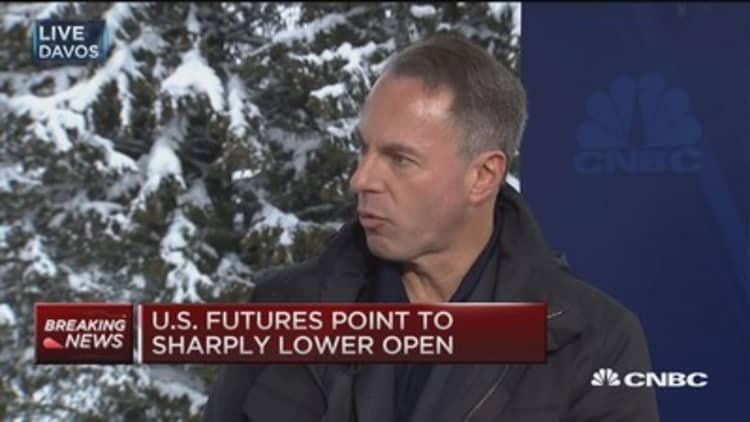
Seven months after PayPal's spinoff from e-commerce giant eBay, the transition is going smoother than many might have thought, said Daniel Schulman, chief executive of PayPal.
After re-listing on the Nasdaq stock market last July, PayPal — one of the world's largest online payment firms — is entering a new phase as an independent company.
The entire project took roughly nine months, half the expected time, Schulman told CNBC's "Squawk Box" on Wednesday in an interview from the World Economic Forum in Davos, Switzerland.
"We set up a completely new corporate network and moved thousands of servers and into our own data centers," he said. "So it was a massive technological split that we had to do, but it went quite well."

Meanwhile, eBay is now taking the opportunity to rebrand and redefine itself, said CEO Devin Wenig, also from Davos.
"We're executing a long-term plan to reposition the business," he said. "EBay without PayPal is a different company and we came to the conclusion early on that we just need to be very different."
Rather than competing with the likes of Amazon, who has dominated the logistics space, Wenig said eBay, which sold nearly $90 billion in goods last year, will rely on the uniqueness and sentimental value of its inventory.
"EBay is a much more emotional brand," he said. "For us, we don't want to compete in logistics. We're never going to be good at that, and I don't want to be almost as good as 'fill in the blank.' I want to be a better eBay."
Wenig added that eBay should no longer be thought of as an online auction site, as it once was, and the company will take steps to paint a clearer picture of what the brand stands for. "The reality is, 80 percent of everything we sell is new; 80 percent of it is [a] fixed price."
As to whether he was worried about competition ramping up once Alibaba fully establishes itself in the U.S., he said, "absolutely."
"And I think Jack [Ma] probably worries we're going to be a challenger to him in China and our pages don't look quite right in China either. But I can almost assure you that there will be a healthy and growing Amazon, Alibaba, and eBay as part of a $14 trillion market opportunity."
Read more 'Squawk Box' in Davos
The National Retail Federation reported for the first time ever on Black Friday that more Americans shopped online than they did in stores. And amid the rapid global shift to digital and mobile payments, retailers took notice.
"There's a tremendous secular tailwind right now toward digital payments," Schulman said. "I think we kind of hit this tipping point this holiday season. And when I talked to a number of retailers, really woke them up to the fact that mobile payments, especially, is here to stay and is growing quite dramatically. We're seeing that across the world right now … [with] growth rates in Europe, Asia, U.S. all accelerating."
PayPal, which has more than 170 million active customer accounts, processed roughly four billion payments last year, a billion of which were made on mobile devices. And with the rise of Wal-Mart, Target, and Android Pay, the competitive landscape for payments is becoming increasingly fragmented.
"The biggest competitor that I see is cash," said PayPal's Schulman. "[Roughly] 85 percent of the world's transactions are still in cash today."
But he has high hopes for the future of payments. "I think we're going to see more change in the next five years than we've seen in the last 30," he added. "Money is digitizing and if you look at the millennial generation, they're really using their smartphones to manage and move money and that's just a look into the future."
And while many payment players have been betting big on point-of-sale technology, adoption has been relatively slow. "There's just not enough penetration right now," said Schulman. "So people are going into a store, finding they can't use that form of payment and then they're just abandoning it. What we're really trying to do is focus first on online and in-app payments, because that is naturally moving to the in-store environment."
"It's not going to be tapping your phone instead of swiping your card," he argued. "A consumer can order ahead, skip the line, pay right with your mobile phone, get rewards instantaneously. When that happens, then I think you'll start to see mobile payments in store start to take off."
PayPal stock ended Friday's trading just under $32, but is off about 12 percent year to date. Meanwhile, eBay shares were about 9 percent since the split.










